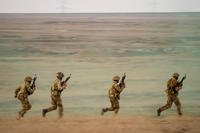After months of internal wrangling over whether to issue a formal apology, the U.S. told Pakistan on Tuesday it was "sorry" for a deadly cross-border air strike last year, prompting Pakistan to re-open the vital ground supply lines.
Secretary of State Hillary Clinton announced that she had given Pakistani Foreign Minister Hina Rabbani Khar her "deepest regrets;" her "sincere condolences;" and – most crucially, said, "We are sorry for the losses suffered by the Pakistani military."
Pakistani leaders had been holding out for an apology after months of high-level negotiations to re-open the ground supply routes that carry materiel from the port of Karachi to American and allied troops in Afghanistan. Although American leaders had expressed "regret" and "condolences" before, as well as reportedly offering to pay Pakistan more for the right to use the supply lines, they had never actually apologized.
Clinton's statement Tuesday did not mention previous negotiations, and it said Pakistan would not exact a premium to resume using the ground supply routes.
"Pakistan will continue not to charge any transit fee in the larger interest of peace and security in Afghanistan and the region," Clinton said. "This is a tangible demonstration of Pakistan's support for a secure, peaceful, and prosperous Afghanistan and our shared objectives in the region. This will also help the United States and [the International Security Assistance Force] conduct the planned drawdown at a much lower cost. This is critically important to the men and women who are fighting terrorism and extremism in Afghanistan."
Clinton also said that Pakistan would not permit "lethal equipment" to travel from Karachi into Afghanistan, except for equipment bound for the Afghan National Security Forces. That provision appears to permit the U.S. to move its own "lethal equipment," -- such as weapons and armored vehicles -- the other way, from Afghanistan to the seaport, for its planned drawdown.
Army logisticians had warned that conducting the U.S. "retrograde" of equipment from Afghanistan without the Pakistani routes might increase its cost fivefold. As it stands, the Pentagon on Friday asked Congress for an additional $600 million to cover the cost of resupplying its forces with only the "northern distribution network," though the top commander in Afghanistan has said he never had any problem getting enough supplies and equipment.
Marine Gen. John Allen told reporters at the Pentagon in May that even with Pakistan's closure of the supply routes, his supplies never fell shorter than a 30-day stockpile, though he said his stocks of gasoline came close. Still, the northern route, including a circuitous rail line and Air Force cargo flights, made resupply more complicated and take longer, Allen acknowledged.
Clinton's apology is a political coup for the Pakistani government, which rejected the official American explanation of last November's cross-border air strike. A Pentagon investigation concluded that mistrust and miscommunication on both sides led American and Pakistani troops to get inaccurate information about each other's positions. When American warplanes staged a "show of force" over a Pakistani border post, but its troops continued firing on American troops, the Americans believed the post was a legitimate target and attacked it.
Twenty-four Pakistani troops were killed. Pakistan, which did not take part in the official investigation, said the attack was deliberate. It closed the over-land supply routes into Afghanistan, bottling up thousands of trucks carrying material to ISAF.
Defense Secretary Leon Panetta issued a terse statement Tuesday that did not mention an apology. It said Panetta "welcomed" Pakistan's decision to re-open the supply routes and reaffirmed his support for "improving our partnership."






























